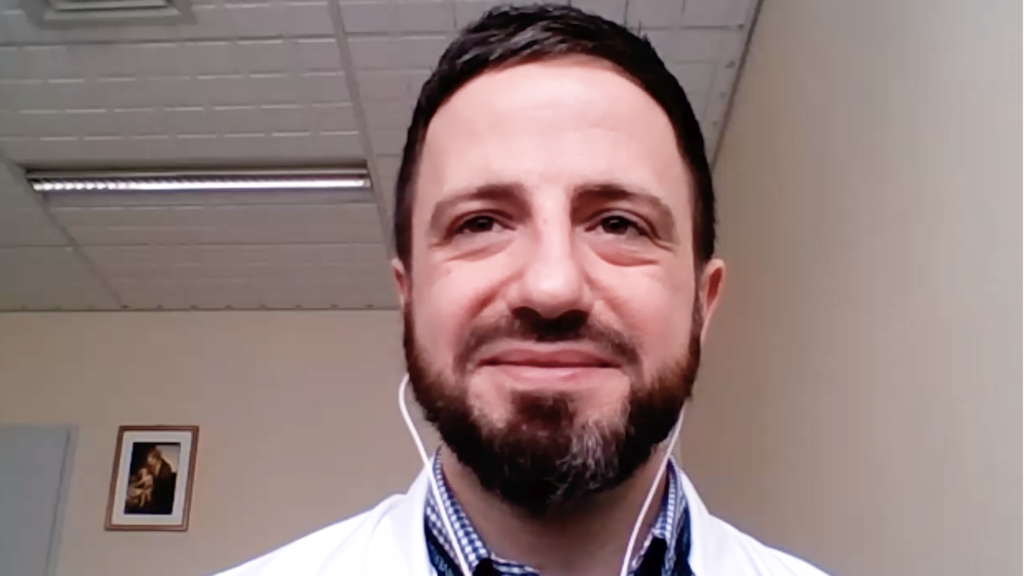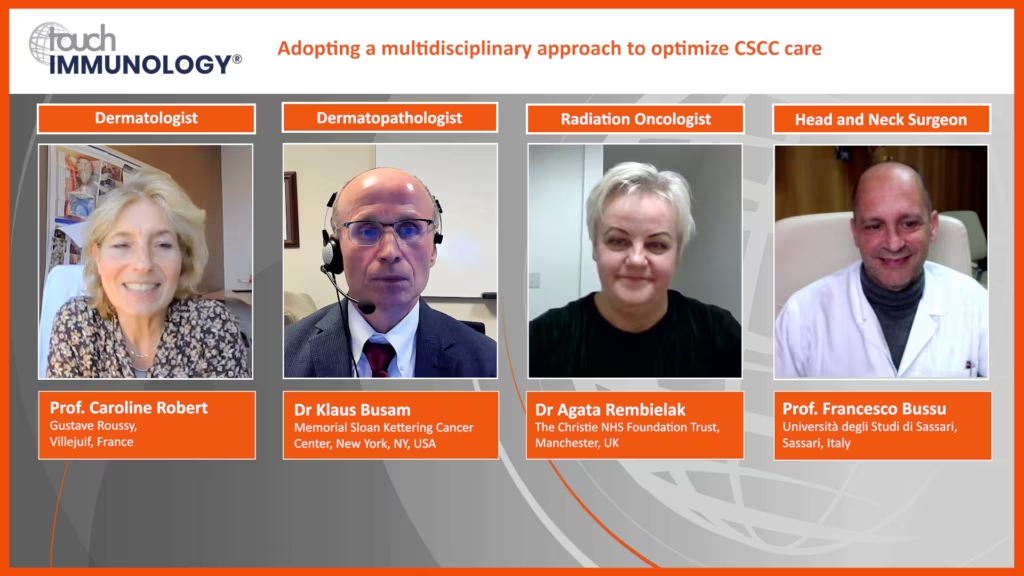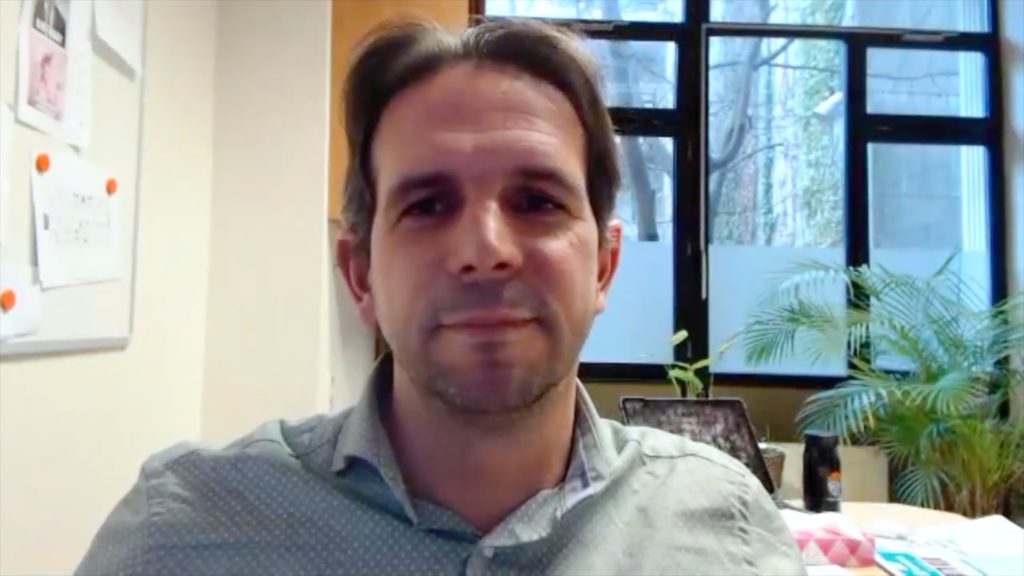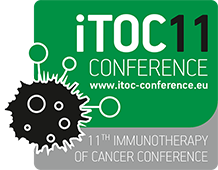Immuno-oncology
An Introduction to Immuno-oncology
Inflammatory immune cells are involved in tumour development and dissemination. As the tumour develops, cancer cells evolve different mechanisms in order to evade attack, by avoiding the immune recognition and developing an immunosuppressive microenvironment. Harnessing the patient’s immune system to attack the tumour is the key principle of immunotherapy. Several classes of immunotherapies including cytokines, monoclonal antibodies against immune checkpoints, autologous dendritic cells expressing tumour antigen, genetically engineered oncolytic viruses and T-cells engineered to expressed chimeric antigen receptors (CAR-T cells), have been approved for many cancer subtypes, including solid tumours and haematological malignancies. Current challenges include elucidating predictive biomarkers, since many people fail to respond to these therapies.
Browse video highlights and short articles from the conference hub, providing insights into the latest updates from major conferences. This is complemented by a range of educational activities from our expert faculty, with patient outcomes at the forefront.
Our supporting partners do not constitute an endorsement of the content on this page.

Physician burnout is at a critical point. In this episode, Nicky speaks with Dr Alfred Atanda about why so many physicians are burning out and what can be done to change the trend. From personal experience to system-wide solutions, Dr Atanda shares valuable insights on improving physician well-being and building a more effective healthcare culture.

In this episode, we explore the future of continuing medical education (CME) with the team behind touchIME. Hannah Fisher and Matthew Goodwin share insights into global and US trends, the importance of patient inclusivity and how educational outcomes are evolving to better measure the direct impact of learning on clinical practice and patient care.

Immuno-oncology is at the heart of Dr Hassan Abushukair’s inspiring journey from Jordan to the USA. A rising star in the field, Hassan combines clinical expertise and bioinformatics to unravel the immune system’s role in cancer, advancing precision medicine. With over 20 publications and prestigious awards, he is paving the way for innovative therapies while championing mentorship and patient-centred research.

Antibody-cytokine fusion proteins are a promising immunotherapy that could overcome off-target immune cell activation and the short serum half-life associated with low-dose interleukin-2 treatment. We were delighted to talk with Dr. Jamie Spangler (Johns Hopkins University, Baltimore, MD, USA) around ...

A defective DNA damage response in cancer cells can lead to genomic instability and impact the immunogenicity of tumours, improving the efficacy of immunotherapy treatment approaches. It was a pleasure to talk with Professor Sandra Demaria (Weill Cornell Medicine, New ...

A defective DNA damage response in cancer cells can lead to genomic instability and impact the immunogenicity of tumours, improving the efficacy of immunotherapy treatment approaches. We were delighted to talk with Professor Sandra Demaria (Weill Cornell Medicine, New York, ...

A joint analysis of patients receiving immune checkpoint inhibitor therapy was conducted using the OnCovid (NCT04393974) and ESMO CoCARE registries, this assessed SARS-CoV-2 outcomes in vaccinated and unvaccinated patients with cancer and whether prior immune-related adverse events affected these outcomes. ...

In this activity, leading experts discuss optimal approaches for the management of patients with CSCC and consider how effective multidisciplinary collaboration can contribute to improved outcomes.







Prof Denis Migliorini (Geneva University Hospitals, Geneva, Switzerland) to discuss his presentation at the ESMO Immuno-Oncology Congress 2021 on the challenges of developing CAR-T therapies for brain tumours, and the future of this treatment in clinical practice. Questions 1. What molecules have ...

Watch leading experts discuss evolving neoadjuvant, adjuvant and metastatic treatment options for patients with melanoma, taking in the latest data presented at the ESMO Congress 2021.

Watch leading experts discuss evolving treatment options for patients with advanced basal cell carcinoma, and how novel immunotherapeutic approaches within the emerging clinical study landscape may improve patient care.





TouchIMMUNOLOGY got the chance to catch up with Hans Prenen (University Hospital Antwerp, Edegem, Belgium) around the potential advantages of non-gene edited allogeneic CAR T cell therapy (Clinical Trial Identifier: NCT03692429). The abstract ‘Updated data from alloSHRINK phase I first-in-human ...
Latest articles videos and clinical updates - straight to your inbox
Log into your Touch Account
Earn and track your CME credits on the go, save articles for later, and follow the latest congress coverage.
Register now for FREE Access
Register for free to hear about the latest expert-led education, peer-reviewed articles, conference highlights, and innovative CME activities.
Sign up with an Email
Or use a Social Account.
This Functionality is for
Members Only
Explore the latest in medical education and stay current in your field. Create a free account to track your learning.





